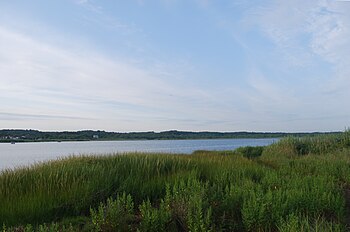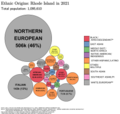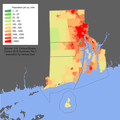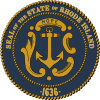The Rhode Island Portal Rhode Island (/ˌroʊd-/ ROHD) is a state in the New England region of the Northeastern United States. It borders Connecticut to its west; Massachusetts to its north and east; and the Atlantic Ocean to its south via Rhode Island Sound and Block Island Sound; and shares a small maritime border with New York, east of Long Island. Rhode Island is the smallest U.S. state by area and the seventh-least populous, with slightly fewer than 1.1 million residents as of 2020; but it has grown at every decennial count since 1790 and is the second-most densely populated state, after New Jersey. The state takes its name from the eponymous island, though nearly all its land area is on the mainland. Providence is its capital and most populous city. Native Americans lived around Narragansett Bay for thousands of years before English settlers began arriving in the early 17th century. Rhode Island was unique among the Thirteen British Colonies in having been founded by a refugee, Roger Williams, who fled religious persecution in the Massachusetts Bay Colony to establish a haven for religious liberty. He founded Providence in 1636 on land purchased from local tribes, creating the first settlement in North America with an explicitly secular government. The Colony of Rhode Island and Providence Plantations subsequently became a destination for religious and political dissenters and social outcasts, earning it the moniker "Rogue's Island". Rhode Island was the first colony to call for a Continental Congress, in 1774, and the first to renounce its allegiance to the British Crown, on May 4, 1776. After the American Revolution, during which it was heavily occupied and contested, Rhode Island became the fourth state to ratify the Articles of Confederation, on February 9, 1778. Because its citizens favored a weaker central government, it boycotted the 1787 convention that had drafted the United States Constitution, which it initially refused to ratify; it finally ratified it on May 29, 1790, the last of the original 13 states to do so. The state was officially named the State of Rhode Island and Providence Plantations since the colonial era but came to be commonly known as "Rhode Island". In November 2020, the state's voters approved an amendment to the state constitution formally dropping "and Providence Plantations" from its full name. Its official nickname is the "Ocean State", a reference to its 400 mi (640 km) of coastline and the large bays and inlets that make up about 14% of its area. (Full article...) Entries here consist of Good and Featured articles, which meet a core set of high editorial standards.
Napoléon "Nap" Lajoie (/ˈlæʒəweɪ/; September 5, 1874 – February 7, 1959), also known as Larry Lajoie, was an American professional baseball second baseman who played 21 seasons in Major League Baseball (MLB). Nicknamed "the Frenchman", he represented both Philadelphia franchises and the Cleveland Naps, the latter of which he became the namesake of, and from 1905 through 1909, the player-manager. Lajoie was signed to the Philadelphia Phillies of the National League (NL) in 1896. By the beginning of the 20th century, however, the upstart American League (AL) was looking to rival the supremacy of the NL and in 1901, Lajoie and dozens of former National League players joined the American League. National League clubs contested the legality of contracts signed by players who jumped to the other league, but eventually Lajoie was allowed to play for Connie Mack's Philadelphia Athletics. During the season, Lajoie set the all-time American League single-season mark for the highest batting average (.426). One year later, Lajoie went to the Cleveland Bronchos, where he would play until the 1915 season, when he returned to play for Mack and the Athletics. While with Cleveland, Lajoie's popularity led to locals electing to change the club's team name from Bronchos to Napoleons ("Naps" for short), which remained until after Lajoie departed Cleveland and the name was changed to Indians (the team's name until 2021). (Full article...)Selected article - The Narragansett people are an Algonquian American Indian tribe from Rhode Island. Today, Narragansett people are enrolled in the federally recognized Narragansett Indian Tribe. They gained federal recognition in 1983. The tribe was nearly landless for most of the 20th century but acquired land in 1991 and petitioned the Department of the Interior to take the land into trust on their behalf. This would have made the newly acquired land to be officially recognized as part of the Narragansett Indian reservation, taking it out from under Rhode Island's legal authority. In 2009, the United States Supreme Court ruled against the request in their lawsuit Carcieri v. Salazar, declaring that tribes which had achieved federal recognition since the 1934 Indian Reorganization Act did not have standing to have newly acquired lands taken into federal trust and removed from state control. (Full article...)Did you know?
Related portalsSelected picture Winnapaug Pond (also known as Brightman Pond) is a breached saltwater pond in Westerly, Rhode Island, United States, connected to Block Island Sound by the Weekapaug Breachway, which was constructed during the mid-1950s. The 2.5-mile (4.0 km) long lake is separated from the Atlantic by a large sandbar. General imagesThe following are images from various Rhode Island-related articles on Wikipedia.
TopicsSelected panoramaMisquamicut State Beach in March 2007
Quality content
Featured articlesFeatured listsGood articles
Featured portalsGood article nomineesFormer featured articlesFormer featured listsFormer good articlesSubcategoriesRelated WikiProjectsThings you can do
Associated WikimediaThe following Wikimedia Foundation sister projects provide more on this subject:
Discover Wikipedia using portals |
























































